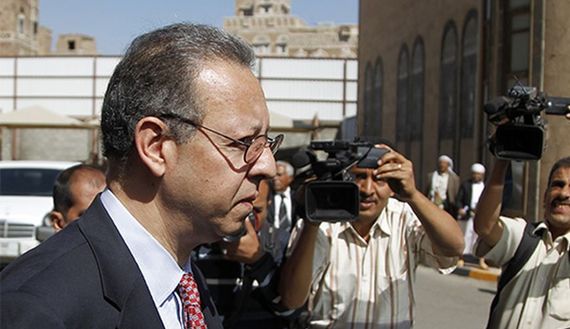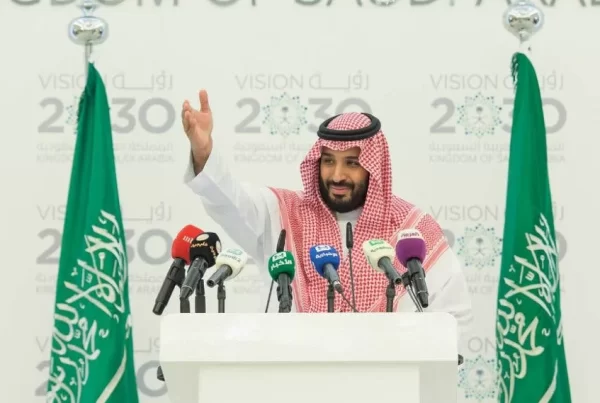In the latter half of March 2011, military and political divisions in Yemen reached their zenith. It was as if the Greek gods of war had marked this month with their own imprimatur. The capital city of Sanaa had endured several terrible nights throughout April and May, as different influential forces battled one another in an armed conflict that pitted personnel and weapons from a divided army on both sides at the points of friction. Sanaa came to resemble Beirut when the latter was divided into eastern and western sections during the civil war of the 1980s. Reports coming out of Yemen indicated that the country was poised on the brink. The grim specter of civil war kept Yemenis awake at night, and even left anxious Western capitals sleepless at the prospect of an already tumultuous Yemen slipping into outright civil war.
At the same time, a UN diplomat of Moroccan origins who worked prodigiously and tirelessly to prevent Yemen from descending into the grips of mass violence suddenly emerged. Jamal Benomar — an adviser to UN Secretary-General Ban-Ki moon — and his delegation to Yemen had not previously been well-known in the country. His extensive experience in working with international institutions did not earn him anything like the attention that his efforts in Yemen have. The latter have turned him into something of an international political star. Yemeni media regularly hosts him as a senior guest, even after his 24th official visit to the country.
Benomar seemed to most Yemenis at the time to be Yemen’s national savior, sent to rescue the country from a civil war knocking at its gates. Yemenis, therefore, followed his role and performance with keen interest. His work was conducted quietly and intelligently by his office, in an effort to win the general public’s trust and support, despite the hesitation and reluctance with which some political actors regarded his role. Moreover, at the same time, some of the urban youth repudiated the Gulf Initiative on principle.
Benomar began to dive into Yemeni politics in all its detail, engineering most of the political agreements concluded during his term. His role reached the point where he put an end to several armed insurrections, such as the rebellion by the former air force chief who refused to surrender his position to a new leader appointed by President Abed Rabbo Mansour Hadi.
Since that time, the man has made his mark on nearly all the details of the current transitional phrase. His role in Yemeni politics has expanded from that of a mere referee between two competing factions to actually calling the shots.
Because the context in which Benomar emerged — namely, his external role in the transitional process — is still ongoing in Yemen, and every political party is courting his favor. He is the only figure who can personally intervene in many sensitive disputes, with the blessing of traditional political actors. This includes, for example, allotting shares of representation in the National Dialogue Conference (NDC) to the various parties in attendance.
Nevertheless, even as Benomar’s understanding of the contending forces in Yemen has deepened for the better, many Yemenis have begun to accuse him of over-identifying with them in a manner that does not suit Yemen’s long-term interests. This is so because his role — and the role of the Gulf Initiative — emanates from a philosophy that believes in the necessity of working directly with the parties aggravating the problem, to turn them into the solution’s stakeholders. He has held to this approach, even if it does not necessarily lead to an immediate return to stability in Yemen.
This approach has prompted Benomar to deal with a number of figures and forces unpopular with the Yemeni street, even as his role is to a large degree limited among the urban youth — at least formally — to nominal representation. Yet, the latter cannot even cope with the power at the disposal of a tribal sheikh or military leader — precisely the sort of figures Benomar has been dealing with on a continuous basis in managing the political transition. As far as Yemenis who are not aligned with, or loyal to, any of these forces, Benomar is putting on equal footing with those who are not equal.
Shifts of time, slow achievements
Since Benomar began his work in Yemen on Aug. 1, 2012, the image many Yemenis had of him has transformed from that of national savior to a “supreme leader” — that is, the [Ayatollah Ali] Khamenei of Yemen. His authority exceeds that of Yemen’s top officials. Indeed, the president runs to him at any time his decisions cannot be enforced or when political or military factions refuse to obey him. No one dares to oppose any of Benomar’s ideas or moves — nor would they even think about doing so. Criticizing Benomar in media outlets affiliated with Yemeni political parties is a red line that goes beyond criticizing Hadi himself — or even more than it was with former President Ali Abdullah Saleh.
The Yemeni street is running out of patience because of the embarrassing catastrophic situations, as it cannot deal with its issues with the same “long breath” approach Benomar and Yemen’s traditional elites do. The country’s public opinion has begun to show signs of discontent with the sluggishness of the political transition now underway as well as with the opaque language of the UN delegate. He has neither identified the reasons for the delay and bungling in the process nor pointed the finger at the parties responsible for them. His periodic reports to the UN Security Council offer the merest hints at disclosing the identity of these parties, opting instead to continue to remain silent in the face of their ongoing obstruction of the political transition.
Despite all the controversy over Benomar, many in Yemen continue to regard his role with appreciation and gratitude for what they see as his strenuous and good faith efforts to provide Yemen with one last chance to regain the sobriquet “Arabia Felix” (literally, “Happy Arabia”), after having stood poised on the brink of disaster.
But at the same time, there is a marked, overt increase in calls opposing this forceful diplomat’s direct intervention in the authorities of those Yemeni parties engaged in national dialogue. These voices insist that he has overstepped his role as a supervisor and facilitator tasked with ensuring the success of the conference, and that it arrives at solutions independently deemed appropriate by Yemenis themselves. As far as this segment of opinion is concerned, Benomar is an international diplomat for whom Yemen is simply another “career opportunity” into which he has currently intruded. They maintain that he has persistently exaggerated the facts on the ground to paint a picture of a unique success for the Yemeni experiment — which he is leading — while in reality that experiment has been unsuccessful. Or, at least, unsuccessful so far.
The seething discontent harbored by this group toward Benomar came out into the open when 46 members of the NDC signed a declaration at the beginning of October condemning Benomar’s report to the UN Security Council on Sept. 27 in which he stated that Yemenis had formed a consensus around a federal system. According to them, this has yet to happen. They strenuously condemned Benomar’s comments, which according to them bore no connection to reality and sought to impose a fait accompli upon the NDC, in contravention of the NDC’s own internal bylaws.
Prominent Yemeni writers and activists recently attacked Benomar’s oversized role, accusing him of engineering political deals among political parties, as an extension of the transitional period. They believe he acts in a fashion congenial to the traditional parties looking out for their parochial interests at the price of achieving even the bare minimum demands of the Yemeni revolution, and at the expense of the search by Yemenis for a future of security and stability. One prominent Yemeni author, Sami Ghalib, even described Benomar as “an emissary of satanic providence” who would “lead Yemenis into a civil war.”
Ghalib and others besides him had already in the past criticized Benomar’s praise in his last report for Hadi’s recent decision to establish the Anti-Corruption Commission. One of the commission’s members — deputized with fighting corruption — was himself a defendant in a criminal murder case but had employed his personal influence to prevent any judicial proceedings from being initiated against him.
In any event, despite all the wide-ranging and mounting controversy in Yemen concerning Benomar’s role, public confidence in both him and his position was great, simply because Yemenis’ confidence in traditional Yemeni political leaders is low. The gap between those parties and ordinary Yemeni citizen is greater than the gap between heaven and earth.
Often, the Syrian model is invoked in international media and diplomatic platforms to demonstrate the comparative effectiveness of the (internationally supported) Yemeni model. Those making these comparisons do so whether or not the Yemeni model is in fact a success or not. Although, by comparison with Syria — a comparison which is in itself exceedingly misleading, unrealistic and barely even coherent — Yemen may be considered a success of legendary proportions.
In the same context, the lack of success, to date, of veteran, respected diplomats such as Lakhdar Brahimi and Kofi Annan in their missions to stop the bloodshed in Syria renders the personal success of Benomar — and, in this context, the comparison between these diplomats is spot on — in Yemen incredible. Benomar has exceeded all the expectations of the optimists and pessimists about the potential international role in those countries affected by the Arab Spring.








